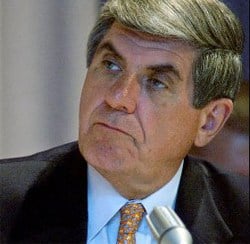Open Left is reporting that Senator Ben Nelson will announce he's voting "yes" on the DADT repeal compromise. With Nelson's vote, Senator Carl Levin could have the votes he needs for the amendment in the Senate Armed Services Committee.
 Nelson is expected to make his announcement at around 11:45 am.
Nelson is expected to make his announcement at around 11:45 am.
Wonk Room is reporting that Senator Robert Byrd may also be a yes.
In related news, an excellent piece from Kerry Eleveld at The Advocate:
"Of course, now that this amendment is on the table, the only thing worse than passing it would be not passing it. Why? Because all those lawmakers and strategists who continually argue that LGBT legislation is toxic will cry 'I told you so' from the rafters if it fails. And a loss on repeal could have an adverse impact on the Employment Non-Discrimination Act, partner benefits, and any other piece of equality legislation waiting in the wings. So how did we get where we are? The White House and Gates seemingly didn't want a vote this year. Activists wouldn't let up. Murphy, Levin, and Lieberman put in a heroic effort to salvage repeal. And in my estimation, when Levin was one vote away in the Senate committee, White House officials realized the repeal train was leaving without them and not hopping aboard was a no-win situation. If it passed, they would get no credit; if it failed by one vote, activists would castigate them for withholding support.
This compromise could still fail, and make no mistake, the deal was brokered by the White House, which then treated it as the redheaded stepchild it never wanted in the first place. But the outcome — win or lose — now has the administration's fingerprints on it, even though its refrain since Monday morning has been that Congress was forcing its hand."
Said Richard Socarides to Politico, on the White House's grudging realization that a compromise needed to be reached on DADT: “They got the message, I think, actually really from Pelosi that [Congress was] going to try to do this with or without the White House. … They could be part of it or not be part of it. She figured if Congress tried to get something done and failed, the White House would be blamed. If it tried to get something done and succeeded, and they stood on the sidelines, they'd look like jerks, and it would sort of make the president look bad. It was her leadership and her willingness to be out in front on this at the end that forced their hand.”



